Brazil nuts are often the go-to source of selenium for many thyroid patients.
They consistently make the list of top thyroid superfoods and are up there with seaweed and oysters in terms of thyroid-boosting benefits.
It’s no wonder then why so many thyroid patients eat Brazil nuts on a daily basis.
The main reason for this is that they are the most selenium-rich food available.
Why would you want selenium for your thyroid?
Well, once you understand how important selenium is for thyroid function it becomes quite obvious.
Selenium helps…
- Convert T4 thyroid hormone into T3 thyroid hormone (1)
- Produce glutathione (2) which protects the thyroid gland from inflammation
- Acts as an antioxidant (3)
- Lower thyroid antibodies (4) in patients with Hashimoto’s
- Protect the thyroid gland (5) from damage due to overconsumption of iodine
- Supports hair growth (6)
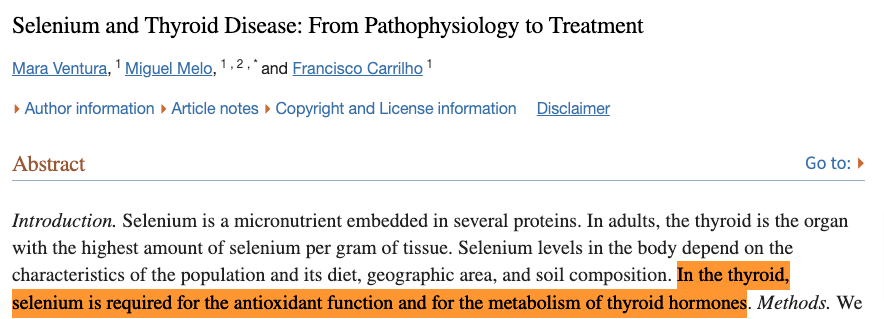
These are all benefits that just about every single thyroid patient would want.
While there are many benefits to consuming Brazil nuts, it’s not always rainbows and roses.
In fact, brazil nuts are far from perfect and have the potential to cause some problems if used incorrectly.
Today you will learn:
- More about why so many thyroid patients consume Brazil nuts on a daily basis.
- The nutritional content of Brazil nuts and why they are so healthy for your thyroid.
- The 3 potential downsides to using Brazil nuts as your primary source of selenium.
- How selenium supplements compare to Brazil nuts and which is the preferred source to use for thyroid patients.
- And how to use Brazil nuts correctly.
Let’s jump in…
DOWNLOAD FREE RESOURCES
Foods to Avoid if you Have Thyroid Problems:
I’ve found that these 10 foods cause the most problems for thyroid patients. Learn which foods you should avoid if you have thyroid disease of any type.
The Complete List of Thyroid Lab tests:
The list includes optimal ranges, normal ranges, and the complete list of tests you need to diagnose and manage thyroid disease correctly!
A Deeper Dive Into Nutritional Value of Brazil Nuts
Yes, brazil nuts are known for their incredibly high selenium content but they also contain a number of other thyroid-boosting ingredients as well.
Each one-ounce serving of Brazil nut contains roughly:
- 542 mcg of selenium 774% DV
- 0.5 mg of copper 55% DV
- 106 mg of magnesium 33% DV
- 205 mg of phosphorus 30% DV
- 0.3mg of manganese 17% DV
- 0.2 mg of thiamine 12% DV
- 1.6mg of vitamin E 8% DV
- 1.1 mg of zinc 8% DV
- 45.2mg of calcium 5% DV
- 186mg of potassium 5% DV
- 0.7mg of iron 4% DV
Of the nutrients listed above selenium, magnesium, thiamine, vitamin E, zinc, and iron all have the potential to help your thyroid.
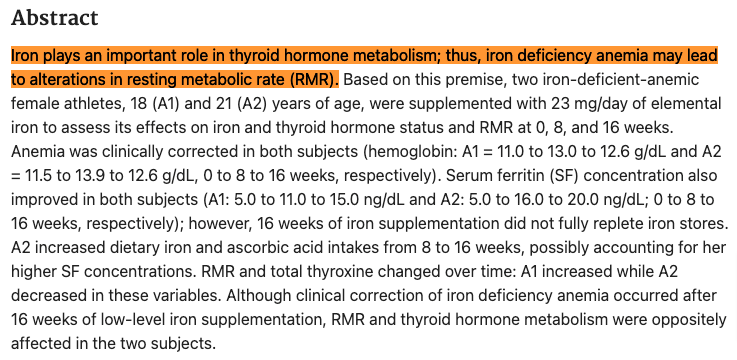
While the doses of the other ingredients are less than what you need on a daily basis, they still have thyroid-boosting potential.
Zinc, for instance, helps with thyroid conversion.
Iron is required to produce thyroid hormone.
Vitamin E is necessary for thyroid hormone cellular sensitivity.
And the list goes on and on.
I bring this up because it’s important to evaluate foods in context with more than just any one single ingredient.
Yes, the selenium content is certainly important, but the benefits that thyroid patients observe when consuming these nuts probably stem from more than just the selenium.
Though, it’s hard not to be excited about the abnormally high selenium content because it’s very rare to find a single food with such a high concentration of any single vitamin or nutrient.
3 Problems with Brazil Nuts
Even though Brazil nuts are jam-packed with thyroid-supporting nutrients, they are far from perfect.
This doesn’t mean they should be avoided (though, that is sometimes a good idea) but it does mean you should be aware of all of the pros and the cons before deciding if you should use them.
Since we just discussed some of the benefits of Brazil nuts it’s only fair to talk about some of the cons as well.
#1. Selenium Content Varies From Nut to Nut.
When you are supporting your thyroid or any system in your body for that matter, it’s a good idea to know exactly how much of something you are taking.
After all, some nutrients can cause problems if taken in excess.
Normally, this isn’t something you have to worry about because plants and animals typically regulate nutrients in their own bodies.
Because we then consume plants and animals, we assimilate their nutrients into our own bodies thereby taking advantage of that regulation.
In other words, animals and plants have systems in their bodies (just like us) to prevent against toxicity of various nutrients.
This prevents us from overconsuming certain nutrients in plants and animals indirectly.
This is normally the case but doesn’t always happen perfectly.
For instance, the selenium content in Brazil nuts is rarely ever consistent and depends on 3 factors:
- The selenium uptake and accumulating capacity of the plant – Some plants accumulate more selenium than others with brazil nut trees (7) being on the higher end of the spectrum. Brazil nut trees will typically take up as much selenium as possible based on what is available to them in the surrounding soil. Plants that take up high amounts of selenium are known as hyperaccumulators.
- Soil selenium content – Even though Brazil nut trees are hyperaccumulators of selenium doesn’t mean that each plant contains the same amount of selenium. Plants can’t move around like we can so they are dependent upon the selenium content of the soil in which they live. If that soil content is high, then the content of selenium in the Brazil nut tree (and subsequently Brazil nuts) will be high. The opposite is true if the soil content is low. The result is that the selenium content of plants varies from plant to plant even within the same generalized area.
- And the presence of other elements in the soil which compete for selenium absorption – Plants take up selenium around them through sulfate transporters (8) in the roots. As you might have guessed, more than just selenium uses this transporter including sulfate. Both sulfate and selenium compete for transport into the roots of plants because they both share the same transporter. When there is more sulfate than selenium in the soil it can impair the transporting of selenium due to competition. This acts as another mechanism that may impact the selenium content of Brazil nut trees.

When you put all of these factors together it’s easy to see that one big problem with Brazil nuts is that their selenium content can vary dramatically from nut to nut.
In fact, one study (9) which looked into this very problem found that the selenium content of Brazil nuts could vary anywhere between 11% of the daily requirement of selenium all the way up to 288%.

This same study found that the selenium content in soil was also highly variable and ranged from <65.76 ug kg to 625.91 ug kg.
If you put this information into context, brazil nuts from the same country can provide anywhere from 6 mcg of selenium all the way up to 154 mcg of selenium in each nut.
Talk about variability.
Why is this a problem for thyroid patients?
Well, selenium really only will have benefits if it’s used in the right amount.
If you are consuming Brazil nuts thinking they have 50mcg of selenium in each nut and you eat 2 nuts per day to try and get your recommended daily dose for your thyroid, you could be getting as little as 11mcg instead of the 100mcg of you are aiming for.
On the flip side, you could be getting as much as 308mcg of selenium in 2 nuts if the tree they came from happened to live in selenium-rich soil.
This will lead to inconsistency in your daily selenium intake and may cause issues from either taking not enough or too much since selenium is really a Goldilocks-type nutrient.
All of this leads us to point #2…
#2. It’s Easy to Take Too Much.
Brazil nuts have been found consistently to contain the most amount of selenium out of all available foods.
This is definitely considered a good thing because it’s often very difficult to get a huge dose of any individual nutrient by just eating one food.
In fact, it’s sometimes very difficult to get all of the daily vitamins and nutrients you need each and every day by eating real whole food.
This shouldn’t stop you from trying but you should be aware that it is difficult which is why many thyroid patients choose to supplement to make sure they hit those goals.
While it is great that Brazil nuts contain high amounts of selenium, it’s also a potential problem for some people who may not be aware of just how much selenium each Brazil nut can contain.
If you are unaware of this issue then you could easily grab a handful of Brazil nuts on any given day and consume way more selenium than your body needs.
And you really don’t have to consume very many to incredibly high levels of selenium.
Eating 6-8 Brazil nuts can yield up to 544mcg of selenium (10).
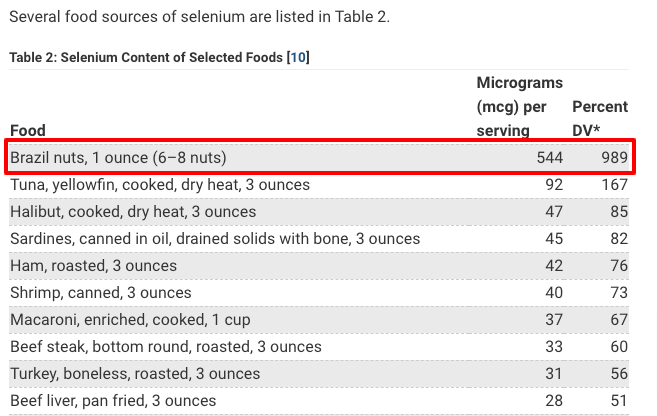
Eating 12-16 Brazil nuts can yield up to 1088 mcg of selenium.
And eating up to 20 Brazil nuts may provide as much as 1,554 mcg of selenium.
Remember:
The RDA for selenium is at 50mcg per day.
Even though the RDA is set at 50mcg per day, thyroid patients do typically benefit from slightly higher doses usually in the range of 50mcg to 150mcg.
But no matter how you look at it, the numbers quoted above are much higher than what is recommended for the regular population and for thyroid patients.
Will taking too much selenium cause a problem?
Yes, and no.

Taking huge doses of selenium in one sitting probably won’t cause a lot of issues but you may run into trouble if you consistently consume that much over a period of time.
We know that true selenium toxicity, known as selenosis (11), is quite rare and doesn’t happen very often, at least not in humans.
So it’s highly unlikely that consuming massive amounts of selenium will lead you to the hospital.
We have a study from 2008 (12) that followed several patients that consumed massive amounts of selenium due to a mislabeled liquid selenium supplement and only 1 person was hospitalized during the incident.
While true toxicity is unlikely, even while consuming 20 Brazil nuts per day, it doesn’t mean it’s a good idea!
Excess selenium intake may not cause hospitalization but it still may cause symptoms, especially in thyroid patients.
And the symptoms you may experience from taking too much selenium tend to mimic the symptoms of hypothyroidism (clouding your clinical picture).
Symptoms of excess selenium include:
- Diarrhea
- Fatigue*
- Hair loss*
- Joint pain*
- Nail discoloration*
- Brittle nails*
- Nausea
- Headache
- Fever
- Tingling
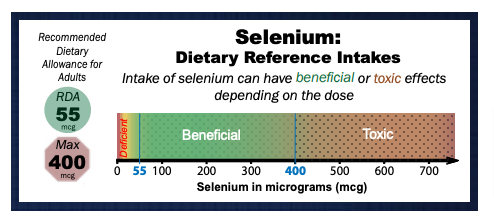
The symptoms listed above noted with an asterisk* are symptoms that are frequently also found at baseline in many low thyroid patients.
The last thing you want to do as a thyroid patient is take something that may appear to make your thyroid symptoms worse!
For this reason, you should be very cautious about how many Brazil nuts you take each day given that the dose of selenium content is so variable and that it’s really easy to take too much.
Unfortunately, there may be some people out there who purchase an entire bag of Brazil nuts and consume way more than they need without understanding the potential complications that can arise from that, but you at least know better now.
#3. Excess Selenium can Make Thyroid Management More Difficult.
Thyroid patients already struggle enough as it is in trying to get their thyroid optimized.
It doesn’t always make sense to throw something into the mix that may make that process even more difficult.
If you are accidentally consuming too much selenium then you may find it difficult to figure out where your symptoms are coming from.
Are you experiencing more hypothyroid symptoms because you are underdosed? Or because you are taking the wrong medication? Or because you are taking too much selenium?
It’s definitely possible to figure out what is going on but it does take time, energy, and a competent thyroid specialist.
If you are lacking any of these three things then it may not make sense to take something that can potentially make your thyroid more difficult.
Should You Eat Brazil Nuts or Supplement Instead?
Given that there are both pros and cons to using Brazil nuts there’s room for a conversation about whether it’s better to get your selenium intake from supplements as opposed to food.
Generally speaking, it’s usually best to get as many vitamins and nutrients from your diet as possible.
Natural sources of vitamins tend to be much better than supplement versions which is why this is the preferred route.
Having said that, it’s just simply not always possible or feasible to get all of your nutrients from food which is why supplements exist.
Whether that be from personal food preferences (maybe you just don’t like certain foods), because the nutrient you want is in food that is difficult to obtain, or virtually any other reason, supplements have their place for supporting the thyroid.
When it comes to getting selenium, I actually tend to lean more toward the side of using supplements instead of Brazil nuts for the following reasons:
- The selenium content of any given supplement will be listed on the back of the bottle – Supplements are not perfect and even selenium content can vary from capsule to capsule but this variability is usually quite small.
- It’s easier to quantify how much selenium you are getting from supplements as opposed to food – If you wanted to get an idea of your total selenium intake from all sources then you’d have to sit down and really do some math and research. You’d need to look at the nutrient content of each food that you consume and then do the math to figure out how much selenium is in each serving and so on. This would be a tedious process and not something that I imagine most people are willing to do. It’s far easier to read the back of a few supplement labels and add up that number than it is to find out how much selenium you are getting from food.
- You can more easily tailor your selenium intake to the amount that your body needs – Even though there are basic recommendations out there for just about every nutrient, those recommendations may not be what works best for you. You may find that you personally do better on lower doses of selenium (or higher doses). You may also find that your individual need for selenium varies over time and so on. It’s easier to adjust how much selenium you take in supplements than it is to adjust how much selenium you take from food.
- Supplements allow you to have more variety in your diet – This isn’t a huge deal for selenium because even if you absolutely hated the taste of Brazil nuts, it wouldn’t be very hard to slam down 1-2 nuts per day. But still, eating food you don’t like isn’t ideal and not something that I would recommend long-term. Using supplements allows you a little more freedom in terms of what you can eat because you no longer HAVE to consume something (brazil nuts, in this case).

Even with all of these benefits, though, it’s still perfectly reasonable to opt to get your selenium intake from Brazil nuts.
If you choose to go this route, then consider a few helpful tips:
- Pay close attention to how you are feeling – It’s a good idea to pay attention to your thyroid symptoms when you try any new therapy but especially if you are going to start taking Brazil nuts. If you notice that your symptoms suddenly get worse when you start using them then that may be a sign that you are getting too much or not enough selenium.
- Try to use the same brand/source of Brazil nuts – If possible, staying consistent with the brand and source of your Brazil nuts can help limit selenium variability. This isn’t foolproof, though, because soil content still matters but controlling as many variables as possible is still ideal.
- Take only 1-2 Brazil nuts each day – Avoid taking more than 1-2 Brazil nuts per day. Here’s why: consuming more than this may increase your risk of taking too much selenium which may cause problems. Not getting enough is likely to provide no benefit but also should not come at the cost of any extra harm either. So staying on the low side increases the odds that you will obtain benefits without negative consequences.
- Add up how much you are getting from supplements – If you do decide to use Brazil nuts as your primary source of selenium it’s still a good idea to have some idea of how much total selenium you are consuming each day. This means you should spend some time looking at the back of the bottle of every supplement you are taking and adding up how much selenium you are getting on any given day. You can then add this to the estimated amount of selenium you are getting from Brazil nuts to give you an idea of your total selenium intake.
Following these steps should minimize negative outcomes while maximizing positive side effects.
If you prefer the supplement route then look for supplements such as this one which contains selenium in the right formulation, at the right dose, and combine it with other thyroid-supporting nutrients.
Final Thoughts
Brazil nuts are an amazing source of selenium and selenium is incredibly important for supporting many different thyroid functions.
While it’s possible to get your daily dose of selenium from just 1-2 Brazil nuts, it’s not always the best idea.
Sometimes, it may make more sense to use supplements to finely adjust how much selenium you are getting each and every day.
But, as always, your mileage may vary and you should always do what works best for your body.
Now I want to hear from you:
Are you using Brazil nuts as your primary source of selenium?
Were you aware of the potential downsides of Brazil nuts?
Do you prefer getting your selenium from supplements?
Is all of this news to you?
Leave your question or comments below!
Scientific References
#1. ncbi.nlm.nih.gov/pmc/articles/PMC5307254/
#2. pubmed.ncbi.nlm.nih.gov/21782571/
#3. ncbi.nlm.nih.gov/pmc/articles/PMC2698273/
#4. pubmed.ncbi.nlm.nih.gov/20883174/
#5. pubmed.ncbi.nlm.nih.gov/19594417/
#6. ncbi.nlm.nih.gov/pmc/articles/PMC6380979/
#7. ncbi.nlm.nih.gov/pmc/articles/PMC6724122/
#8. frontiersin.org/articles/10.3389/fpls.2016.02074/full
#9. pubmed.ncbi.nlm.nih.gov/28923728/
#10. ods.od.nih.gov/factsheets/Selenium-HealthProfessional/
#11. ncbi.nlm.nih.gov/books/NBK216723/
#12. ncbi.nlm.nih.gov/pmc/articles/PMC3225252/
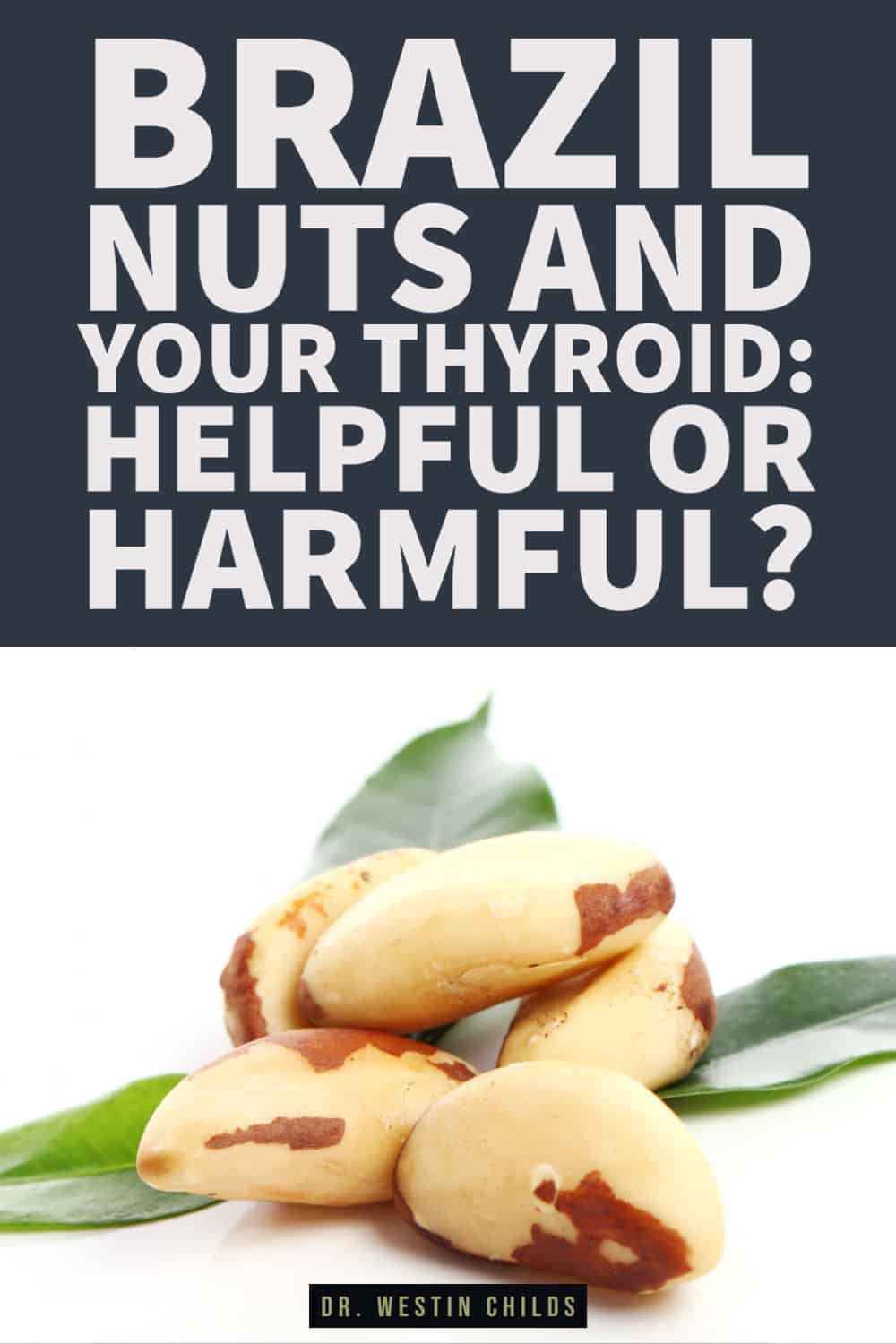
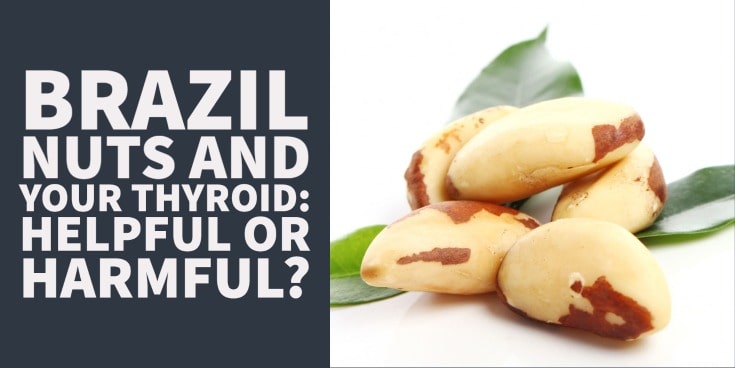
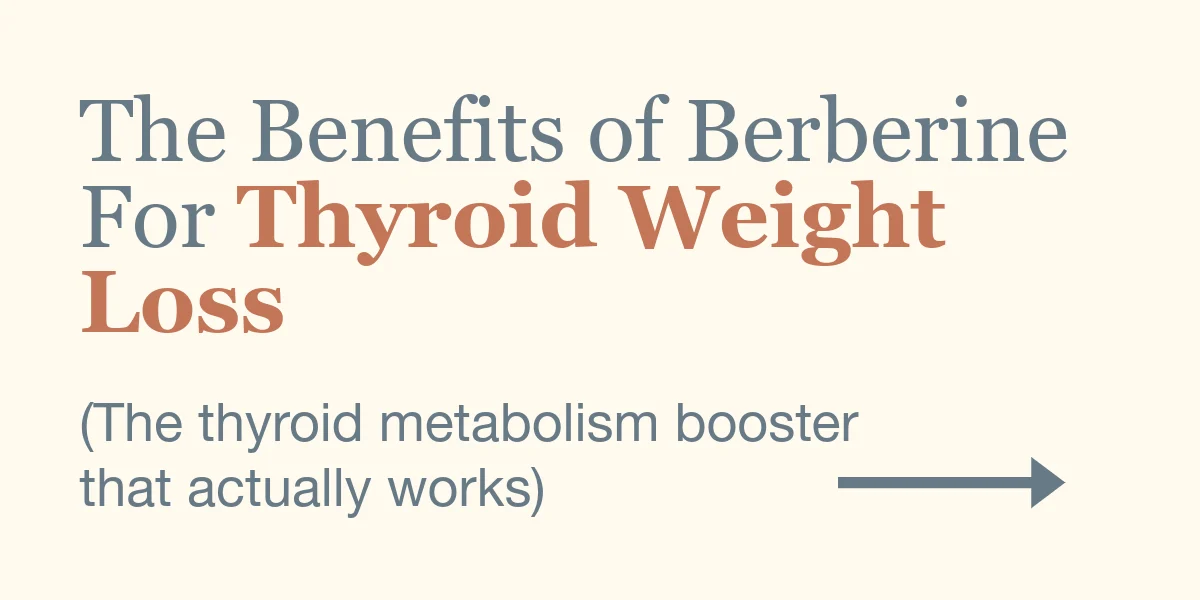






I JUST GOT BACK MY THYROID BLOOD TESTS.
I HAVE HYPOTHROIDISM AND MY DOCTOR TAKES THE USUAL
TSH AND T4. HE REFUSES TO ADD THE FREE T3 REVERSE T3.
I AM STILL SUFFERING FROM DEFICITS. I HAVE STIFFNESS EPISODES OF MYALGIA AND NOW HAVE BROKEN OUT IN HIVES. I HAD 2 BRAIN RESECTIONS AND 30 SESSIONS OF FRACTIONATED RADIATION IN 2010.
MY PITUTARY MIGHT HAVE BEEN AFFECTED. THE RESULTS ARE TSH IS 0.297 WHICH IS LOW AND MY FREE T4 IS 16. I FEEL MY HYPOTHROIDISM HAS CONTRIBUTED TO MY HEALTH DECLINE. I JUST NEED SOME ANSWERS BECAUSE MY DOCTOR IS NOT OPEN FOR DISCUSSION.
Hi Linda,
The single best thing you can do is spend some time and energy finding a more competent thyroid doctor. This strategy works a lot better than trying to convince a doctor to do something new. You can use this resource to help you find one: https://www.restartmed.com/how-to-find-a-doctor-to-treat-your-thyroid/
Hi Dr. Childs,
I hope you are well. I am 12 pounds overweight and hypothyroid. I ended up on 45 mcg of sustained release T3 which helped take off 3 pounds and then the weight loss stopped. Now, the doctor has me up to 75 mcg of immediate release T3 and throughout the day water accumulates around my stomach area that makes it look fat even though I can tell it is water under my skin. I think that I have actually gained some water weight and my stomach is more bloated. By the end of the night, my stomach is more bloated and then I take my last dose of 25 mcg at 10:00 p.m. My doctor says to keep raising the dose until the water starts to come off and states that some patients need to be on as much as 125-200 mcg a day. Is it possible that too much T3 could raise cortisol levels which could cause the same symptoms as low T3? I am at a loss and afraid to keep raising the dose. Thank you and I appreciate everything you do for thyroid patients.
Sincerely,
Katherine
Hi Katherine,
Excess T3 typically does not cause the symptoms of low T3 but excessive T3 dosing can certainly lead to problems. You can read more here: https://www.restartmed.com/high-t3-symptoms/
These side effects may include water retention, hyperthyroid symptoms, and even paradoxical weight gain.
This is an additional piece of warning about the usage of Brazil nut. Do not consume more than one or two a day. It is really very rich with elements, including the toxic ones. One of them is Barium. According to literature data it contains up to 2200 mcg of Barium per gram of Brazil nut, and this is very much: Cardoso, B.R., et al., Brazil nuts: Nutritional composition, health benefits and safety aspects. Food Res Int, 2017. 100(Pt 2): p. 9-18.
Hi Dr. Nizhnik,
Thanks for pointing that out! The barium content is yet another reason to proceed with caution when using Brazil nuts.
Question, a person that don’t have thyroid problem can take you vitamin for the hair grow
Hi Otilia,
Yes, those without a thyroid can still benefit from Thyroid Hair Regrowth Complex.
Thank you Dr. Alexander for pointing that out since I was thinking about supplementing with Brazil nuts when I do not have a supplemental form of selenium on hand.
I would also like to point out that according to data provided by Dane Wigington of GeoengineeringWatch.org, climate engineering components also contain high amounts of nano-sized barium being dispersed in our breathable air column.
I will be avoiding Brazil nuts altogether based on all that data.
I had thyroid cancer and hashimotos so my thyroid was removed in May of 2020. Now I suffer from hypothyroidism amd hypoparathyroidism. I take a lot of calcium citrate, as well as, calcitriol, magnesium oxide, vit D cytomel,and levothyroxin. I feel like I will never feel like I did prior to my thyroid removal. Can your pills help me fill better? (I did lose a lot of hair and suddenly got vitiligo too!)
Hi Lisa,
We’ve had many people in a similar situation as yours feel better when using them! I would recommend checking out the reviews for my bundle designed for those without a thyroid here: https://www.restartmed.com/product/thyroidectomy-rai-bundle/
Great article did I read somewhere Brazil nuts affect sleep was just wondering what would be the best time to eat one
Thanks
Hi Mitch,
You can experiment by taking them in the morning or at night to see if they help you with sleep.
I just came across this article and have a question! I’ve recently heard about benefits of Brazil nuts and have been eating 2 a day (I’ve skipped a few days here and there) for a couple months now. I recently had a physical and my tsh is really low! I’ve been taking .125 synthroid for 32 years, no change, but my dr is lowering it to .112 and test in 6 weeks. Do you think the Brazil nuts caused this huge change? My T4 is in normal range. I also had my iron checked and my ferretin was 404! Will be retesting that in 6 weeks. Dr said that could be from an illness I had over winter that lasted 2.5 months. Would love to hear your thoughts!
Hi Lori,
It’s a possibility but there are so many factors that can influence your TSH so it’s hard to say with any degree of certainty.
I am on levothyroxine .025mg and I want to start eating brazilian nuts, I just want to make sure it is safe. My dr. couldnt give me info she did up my medication to .075 and I havent started I am still on my low dose. Would you recommend staying on the low dose and eating the brazilian nuts?
When it comes to thyroid and food/supplements, I think it’s wise to switch up what you’re doing every so often to ensure nutrient diversity and to not overload your body. Whether that be via supplements or food to get those micronutrients your body needs. When you have autoimmune hypothyroidism, aka Hashimoto’s (which autoimmunity is usually one of the chief causes of low function), your body can have times where it is more sensitive to food and supplementation, even when your gut is healed and your labs are looking pretty.
For example, I was fine having a couple Brazil nuts a day for about a week, then suddenly my body totally rejected it. For me, sometimes that means my body simply has enough and doesn’t need more, or my body can’t tolerate it at the time and rejects it. I can take a break and come back to it depending on what it is, but for me personally the Brazil nut was just too saturated and intense.
I think for some people even half of a Brazil nut every other day would be good! But like you said, there’s not solid way of knowing exactly how much mcg of Se it contains.
Anyways, that you for this article it was interesting to read! I appreciate that you shared your research as well as your thoughts on it.
The issue I have with Brazil nuts is that every other nut, it seems, is rancid from the fragile oils they contain with a short shelf life, I don’t know how healthful it is eating rancid nuts. I have heard the criticism and health risk of taking some fish oil pills, for example, is you can’t tell if they are rancid or not…
another reason to be careful with brazil nuts is the oxalate content!
This can be a problem for a lot of people 🙂
I freeze Brazil nuts they cannot be found at Christmas. Is this safe?
Hi, My name is Helene Comeau, I had Thyroid cancer 18 yrs. ago and they are still adjusting my doses of Synthroid. I had everything removed and do not have any Thyroid left. Am feeling tired all the time, would Raw Brazil nuts help me if I ate so much per Day. Desperate to feel BETTER…
Hi Helene,
I would recommend checking out this article for more help: https://www.restartmed.com/how-to-optimize-thyroid-medication/
Wow this articje just made me realize I maybe eating too many Brazil nuts! I normally eat about 10 a day with blueberries as a snack prior to workouts. Is that too many as a patient with hypothyroidism and. Hashimotos?
Hi Ashley,
Not necessarily, just keep an eye on your symptoms. There’s some evidence to suggest that people can tolerate higher selenium intake when it comes from whole food sources versus when it comes straight from supplements.